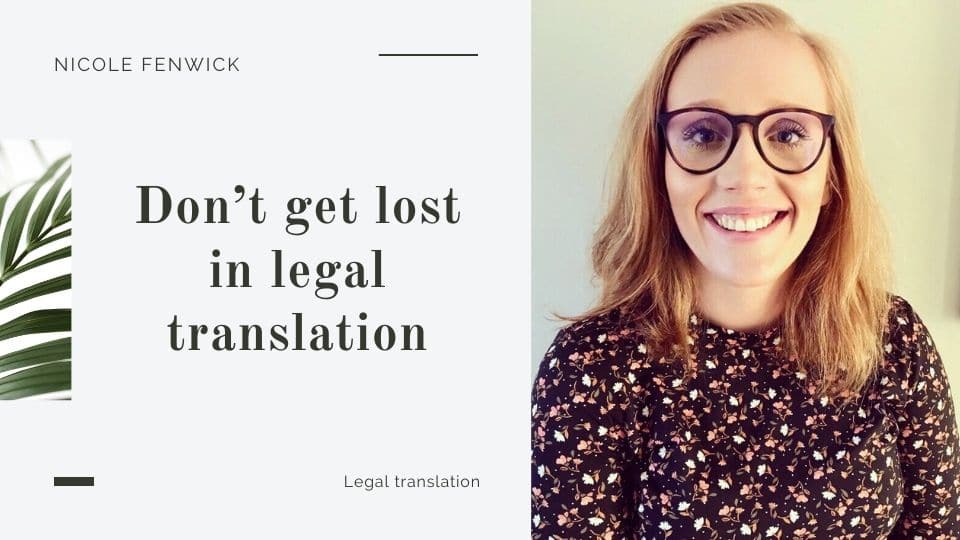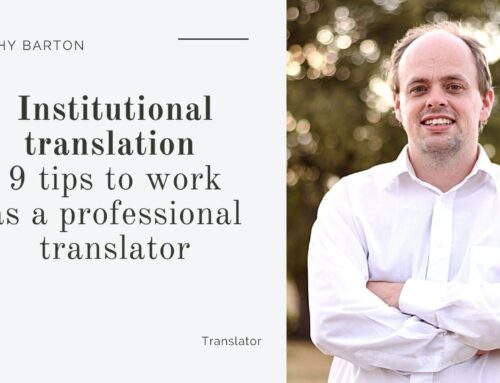Legal language is a language in its own right and if you don’t know your civil law from your common law, it’s an absolute minefield. As a legal translator, you have your work cut out because you need to navigate two languages and legal systems. It’s not for the faint-hearted but while this specialism may be high risk, it’s also high reward.
Legal translation is a risky business
Simply put, you wouldn’t go to a heart surgeon for brain surgery. Yes, a heart surgeon is a surgeon, but they don’t specialise in the part of your body in which you require treatment. They might understand the medical language, but they don’t understand the inner workings of the human brain. You wouldn’t risk your life, so you shouldn’t take risks when it comes to your words either.
The best advice I can give you to navigate two legal systems effectively is to be hyper-specialised. There is a lot to be said for niching down. When it comes to legal translation, you can never be too specialised because the narrower the specialisation, the better you’ll understand the legal system. The lawyer who drafted the contract or the will that you’re currently translating has specialised, so you should too! Otherwise, it’s like asking a tax lawyer to defend a suspected murderer and I think we can all agree, that’s not giving the defendant a fair trial.
Double trouble
Legal translation really is double trouble and that’s one of the many reasons why I love it. Everyone loves a challenge, right? It requires a lot of skill, several qualifications, and years of practice. Now throw another legal system into the mix and you have a very steep learning curve. Legal translators must be able to understand the legal terminology used in both the source and target languages, as well as be aware of the nuances of the source and target legal systems. Legal translation is double trouble because not only do you need to translate the written word, but you also need to translate the system. After all, what’s the point in translating the word if it doesn’t even exist in the target legal system, or worse still, it means something completely different? Lawyers from other jurisdictions won’t thank you.
As a lawyer in a foreign jurisdiction, mastering a foreign language is impressive enough, never mind trying to master the foreign legal system as well. I teach legal English to French lawyers and notaires who want to break into the English-speaking market, and I see first-hand how difficult it is for my clients to explain how a French legal concept works in legal English. Maybe their clients are trying to purchase a property on the French Riviera before the Brexit deadline, or perhaps this year’s events have prompted them to make a will. If they’ve purchased property back in England or written an English will, they might need to relate to a legal concept from their legal system to help them navigate another. But what happens if there isn’t one? Now, this is where it gets fun.
Is there a legal equivalent?
As translators, working with words is what we do. But as a legal translator, you need to know how the words fit into the target legal system because that’s what makes a legal translation worth its weight in gold. Legal language is linked to a national legal system and therefore the law and legal language are system-bound, and they cannot be separated. Legal language is intrinsically linked to the history, society, and culture of a language. But do you know your way around the system?
The first thing you need to know if you’re translating from a European language into English or the other way around is that you’re navigating between the two major legal systems: civil and common law jurisdictions. To navigate between the two, you need a map to help you understand how they work and differ. The common law system used in England and Wales is predominantly founded on a system of case law or judicial precedent, whereas the primary sources of law in civil law are codes and enacted statutes. So here we have two systems which have some things in common, but ultimately, they are hugely different. And while there will always be some common ground between the two, they will continue to remain country-specific. So, when it comes to translating between the two, your old friends equivalence, literalism and loyalty often go out the window. Literal translation and loyalty to the text are of no use to you in the realm of legal translation because a legal term or concept cannot be blindly transferred from one country to another.
Some legal terms are simply systemic and have no legal equivalent in the other jurisdiction. The law of equity and trusts is fundamental to English law but is nowhere to be seen in Romano-Germanic legal systems such as in France. While the French legal system clearly distinguishes between private and public law, English law does not make such a distinction as common law applies to all disputes. Here are just two examples of entire parts of the law which simply don’t exist or differ entirely in practice. And the more different the legal systems are, the more difficult legal translation becomes. While the common law and civil law systems differ considerably, the gap can sometimes be narrowed but your job becomes considerably harder when your legal systems are a million miles apart.
In legal translation, there are always faux amis. Literal translation can often get you into hot water when it comes to legal terms, certainly if you translate ‘un magistrat’ as a ‘magistrate’. They may look the same but, they couldn’t be more different as in France it’s a professional judge and in England and Wales, it’s a lay judge. A French ‘crime’ is also much more serious than an English ‘crime’ which is a word we often throw around.
Mission impossible
As a translator, it’s almost against my religion to say that something is untranslatable, but sometimes it is. And to try and prove otherwise would just be professional suicide. It never ceases to amaze me how the English trust is almost like a mythical being for jurisdictions where it simply doesn’t exist. As a teacher, I’ve developed different teaching methods to explain how the trust works because I can’t give a French lawyer an equivalent. But when it comes to translation, if you can’t translate it, footnotes are your friend. Footnotes in a poem would be a disaster but luckily, lawyers love a good footnote. But what they love even more is to have an accurate legal document, so feel free to explain a legal concept. In fact, I highly recommend it. The concept of ‘cause’ in French law is the reason why a person enters into a contract and while ‘consideration’ in English law is its closest ally, they aren’t a perfect match as it differs in the application and scope. Translating it would be a mistake and can you afford to get it wrong?
Closing arguments
As translators, we were born to translate but sometimes you need to take a step back and find your way through the inner intricacies of the two legal systems first. Otherwise, you risk getting lost in legal translation. You need to think like a lawyer to successfully navigate between the common-civil law divide. The only way you can do that is legal qualifications, experience, and knowledge acquisition. Legal translators have often spent time in legal practice and their acquisition of legal terminology and understanding of legal systems stands them in good stead for a career in legal translation. Unfortunately, watching a few episodes of Suits simply does not cut it.
And where does machine translation fit into all of this; I hear you ask? I think we can all agree that sometimes machines really can make our lives a lot easier but until they can think like a lawyer and a translator, I think we can rest easy at night. I’m confident that there’ll be a place for legal translators for years to come, particularly with the impending Brexit deadline. After a difficult year, it’s hard to predict the future but I’m going into 2021 knowing I’ll be able to do what I love for a while yet.





Leave A Comment